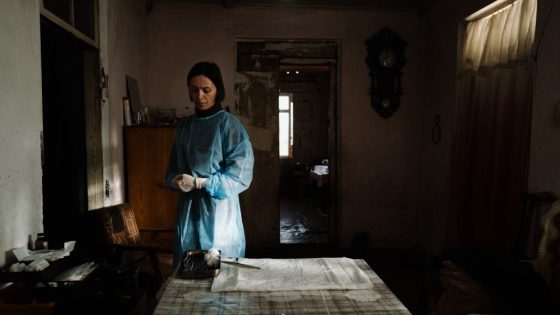Abortion in Georgia is officially legal, though it may as well not be. A woman may request a termination up to 12 weeks into her pregnancy, but given the vehemence of public and political opposition to the practice, she’s unlikely to find a clinic that will agree to perform it. It’s a phantom right, then, its yes-but-no deception just one of the manifold ways in which women’s lives are curbed and constricted by a world that promises more liberty than it grants. An expert obstetrician in a hard-up patch of Eastern Georgia, Nina (Ia Sukhitashvili) has become stoically accustomed to this oppression, using her abilities and relative social privilege to work around it where she can. But years of chafing against the system have come at considerable cost to her inner life — and even, in the most nightmarish interludes of Dea Kulumbegashvili‘s staggering sophomore feature “April,” her very sense of personhood.
An uncompromising, intensely felt panorama of female identities, agencies and desires under attack — by the patriarchy, certainly, but sometimes by the intangible cruelties of nature itself — “April” manages to be both a work of controlled formal rigor and unleashed, often overwhelming human feeling. As such, it makes good on the colossal promise of Kulumbegashvili’s 2020 debut “Beginning,” another startling study of womanhood persecuted and violated in Georgia’s rural heartland, while pushing her filmmaking into greater extremes of surrealism and unblinking real-world observation. Perhaps the most declarative and challenging statement of directorial intent in this year’s Venice competition, the film should cement its 38-year-old helmer on the festival auteur A-list, though it remains a tough proposition to distributors.
As jury president at the San Sebastián festival in the year when “Beginning” swept the board, Italian filmmaker Luca Guadagnino was sufficiently dazzled by Kulumbegashvili’s first film to offer his services as a producer on her second. Anyone wondering if the collaboration might augur a crossover into more mainstream arthouse territory will be swiftly put right in the film’s alternately oblique and explicit introductory minutes. It opens on the image of a creature, humanoid but alien, hunched in darkness against a shifting sonic backdrop of children at play, rainfall and eventually the unidentifiable being’s own heavy, phlegmy breathing. Its skin is stretched and bunched where you mightn’t expect, its face an unreadable flesh mask, its stance at once unnerving and vulnerable.
Before we can consider the significance of this eerie, unexplained presence, however, we’re thrust into blunt, bloody reality: a glaringly lit overhead shot of a woman in labour, leading into the first of two live-birth scenes, both about as graphic as any presented in narrative cinema. (Kulumbegashvili spent a year at a maternity clinic gaining the confidence of the real-life expectant mothers in question, eventually filming with her actors placed amid working medical professionals.) Amid unbound screams and bodily fluids, a baby emerges, but makes no sound.
Afterwards, Nina, the supervising OB/GYN, maintains no expression at all as the infant’s death is litigated by her superiors and the stricken working-class parents. In the mother’s silent withdrawal, Nina senses exhausted relief as much as grief: Motherhood many times over is the presumed duty of women in this rural region, and many babies aren’t necessarily wanted by their carriers. The father, however, is vocally incensed that a woman oversaw the birth — and a woman, furthermore, whom he knows has performed private abortions in the community. The latter, employment-threatening accusation he hurls at Nina in private, though she’s unfazed. “Other than my job,” she later explains to her boss, “I have nothing to lose.”
That hardened, hard-earned sangfroid is evident as we proceed to follow Nina through the tasks and trials of her everyday life: her rounds at the maternity clinic, performed with cool but reassuring professionalism; the brisk, anonymous sex she has with men picked up on country roadsides; and her long after-hours drives to remote villages, where she provides covert abortions and dispenses birth control to young women in need. It’s a solitary, not obviously happy routine, but one of her own design, on her own terms. She used to be in a relationship with David (Kakha Kintsurashvili), her colleague at the clinic, and while Kulumbegashvili’s spare script never articulates the details of her past, it’s clear she’s carrying some level of baggage that makes her a fierce guard of her own independence. It’s when the carefully separated strands of her existence begin to entwine — over a termination for terrified non-verbal teen Nana (Roza Kancheishvili) — that she first demonstrates a quiver of panic.
“April” unfolds with the high-stakes, breath-stopping tension of a thriller, minus any undue compression or manipulation of plot points, and a hyper-poised camera content to watch any scene play out for precisely as long as it takes — be it a delicate medical operation, a chilly office conference or a rural hailstorm of biblical proportions. As in “Beginning,” Kulumbegashvili and her gifted DP Arseni Khachaturan favor long, still, exactingly framed takes that work up a nervy level of friction between the seen and unseen — never more so than in one harrowing scene of Nina at work on a kitchen table, her patient’s body cut off from her off-screen expressions of anxiety.
A mixture of accomplished actors and local non-professionals, the cast works with this heady formalism rather than around it. As calmly devastating as she was in “Beginning,” stage actor Sukhitashvili again makes her Swintonian physical bearing and stark expressive control instruments of her director’s expansively severe vision. Yet her performance is equally impressive when she’s off-camera, vocally standing her ground in confrontational dialogues, as we’re placed directly in her body.
It’s Lars Ginzel’s layered, rattling sound design that often wrests the film from abrasive realism into the realm of radical subjectivity, and even the uncanny. Amplifying the racket of raging weather, the muffled workings of the human body or the hum of interior white noise, it merges with a brittly echoing score by experimental composer Matthew Herbert — played with the same equine-skeleton instrumentation he used for his cult album “The Horse” — to suggest something of the inner scream pushing against Nina’s outer composure.
The creature returns and recurs, too, appearing in Nina’s home and in the fertile natural landscape that Kulumbegashvili often films with iridescent pictorial beauty, as a pointed counterpart to the boxed-in, rule-bound austerity that men have designed for themselves. Perhaps the creature is an embodiment of how Nina sees herself in this world, distanced from the attachments and entanglements of human relations, an intractable other. But “April” is loath to explain itself, inviting us instead to watch, listen and feel our way through it — a work marked, like the benevolent but unreachable woman at its center, by immense empathy and isolated, inconsolable despair.
Source Agencies



